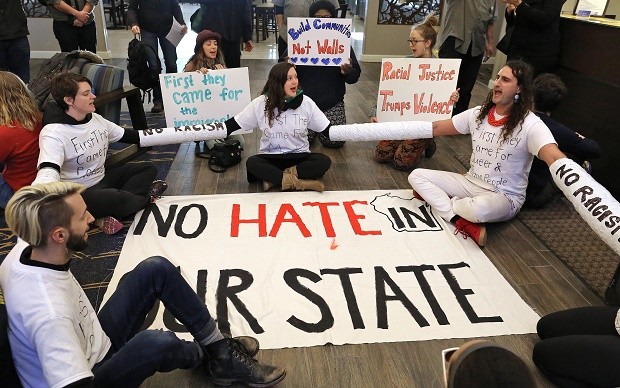Trump faces rough reception as race turns toward Wisconsin

Protesters stage a sit-in in the lobby of the Holiday Inn Express in Janesville, Wis., Monday, March 28, 2016. Demonstrators occupied the lobby of the hotel, protesting a planned Wisconsin campaign stop by Republican presidential front-runner Donald Trump. ANTHONY WAHL/THE JANESVILLE GAZETTE VIA AP
MADISON, Wisconsin — Republican front-runner Donald Trump faces a rough reception as the primary race turns toward Wisconsin where his two remaining rivals hope to put a roadblock on the billionaire’s drive to secure the party’s presidential nomination.
The Wisconsin primary on April 5 is shaping up to be a key moment in the Republican nomination contest. A solid win by Texas Sen. Ted Cruz would narrow Trump’s path to the nomination and increase the likelihood of a contested convention this summer. Cruz — who has recently picked up a wave of Republican establishment support — has been crisscrossing the state and has begun airing $500,000 in ads. Ohio’s Republican Gov. John Kasich was also looking to pick up support in Wisconsin.
As Trump prepared to campaign in the Midwestern state, Wisconsin’s Republican Gov. Scott Walker said that he will announce Tuesday whom he’s backing on a Milwaukee-based talk radio show whose conservative host Charlie Sykes has already endorsed Texas Sen. Ted Cruz. Walker, whose short-lived run for president ended in September, has been sending signals he intends to back Cruz.
Meanwhile, Cruz heaped praise on his former rival, calling Walker’s fight against labor unions “inspired people all over the country.”
Walker said last week that Cruz was the only candidate who had a chance at beating Trump. When Walker ended his presidential bid, he called on other candidates to also quit the race so it would be easier to take on Trump.
Article continues after this advertisement“I am a big, big fan of Scott Walker’s,” Cruz told reporters before a campaign stop in central Wisconsin. “He is a terrific governor and strong conservative.”
Article continues after this advertisementOn Monday, Trump endured a harsh grilling from Sykes, an influential voice for local Republicans.
Sykes pressed Trump on a range of issues, including whether he should apologize to Cruz’s wife, Heidi, whom he mocked on Twitter last week. Trump indicated that he was simply retweeting a message from a supporter who had posted an unflattering photo of Heidi Cruz next to a glamorous shot of Trump’s model wife, Melania.
“Is your standard that if a supporter does something despicable, that it’s OK for you, a candidate for president of the United States, to behave that same way?” Sykes asked. “I mean, I expect that from a 12 year-old bully on the playground, not somebody who wants the office held by Abraham Lincoln.”
READ: Cruz-Trump spat over wives takes nastier turn
Sykes said that he hoped Trump realized that “here in Wisconsin we value things like civility, decency and actual conservative principles” and asked him to declare that wives would be off limit in the discourse ahead of the state’s primary. Trump said he would be in favor of that but said that he would not apologize until Cruz first said he was sorry for the ad his supporters ran in Utah featuring a photo of a partially clad Melania Trump that had originally appeared in GQ magazine.
Cruz has said he knew nothing about the ad, which was published by a Super Political Action Committee that backed him.
Trump has scheduled a campaign rally on Tuesday in Janesville, Wisconsin, but protesters were already awaiting his arrival.
The Janesville Gazette reported that about 60 protesters occupied the lobby of the Holiday Inn Express in Janesville Monday night and about 20 more stood outside.
In the Democratic race, Vermont Sen. Bernie Sanders swept three Western state caucuses over the weekend, but still faces an uphill climb to overcome front-runner Hillary Clinton’s significant lead in the all-important delegate count.
Based on primaries and caucuses to date, Clinton has 1,243 delegates to Sanders’ 975. Including superdelegates, party leaders who are free to support any candidate, Clinton has 1,712 delegates to Sanders’ 1,004, leaving her shy of the 2,383 it takes to win the nomination
Clinton kicked-off her Wisconsin campaign on Monday with a speech in Madison, where she urged voters to consider what Trump might do to shape the Supreme Court by picking one or more justices who “could demolish pillars of the progressive movement.”
The increasingly vitriolic battle between Trump and Cruz was also being fought out in states that have already held their primary contests and were now choosing their delegations to the national convention that will select the nominee in July in Philadelphia. Under party rules, delegates are pledged to candidates based on primary and caucus results on the first ballot at the convention, but may be released to support other candidates on subsequent ballots leading to unpredictable results in a contested convention.
Trump heads into Wisconsin with 739 delegates to Cruz’s 465. Kasich lags behind with 143. Trump’s rivals are scrambling to pick up uncommitted delegates who had been pledged to candidates who quit the race such as Florida Sen. Marco Rubio, since just a handful of delegates might determine whether Trump gets a first-ballot nomination.
READ: Protests against Trump risk backlash in Republican primary
Trump’s presidential campaign said Monday it plans to challenge Louisiana’s delegate selection, a day after the candidate threatened to sue over the possibility that the state’s uncommitted delegates could back Cruz. Trump narrowly won the Louisiana primary.
Trump adviser Barry Bennett said that the campaign intends to file a complaint with the Republican National Committee protesting how the state’s delegates were chosen.
Trump’s threat to file a lawsuit serves as a taste of the kind of backroom procedural wheeling-and-dealing that could come to define the Republican convention if Trump fails to lock down the 1,237 delegates necessary to win the nomination outright.